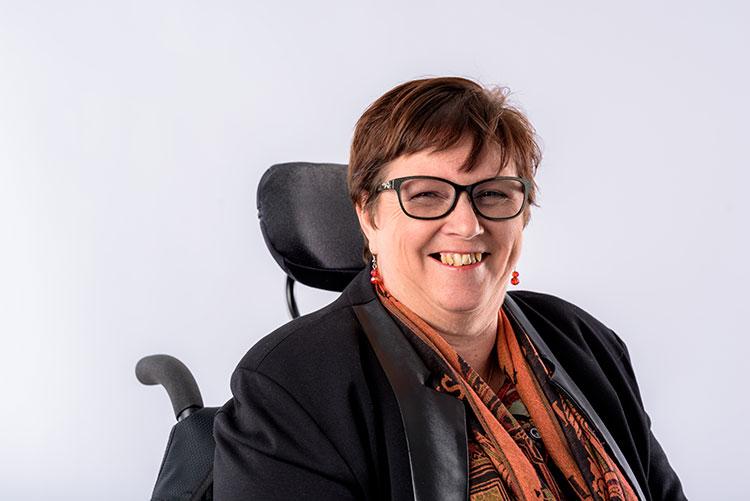
Top Tips for Carers
Disability consultant and human rights advocate Lynne Foreman shares her insights for support workers on what works best for carers, and gives her top tips for carers.
This article was published in the Gen U REALISE Magazine Vol 2. Photo credit Nitch Photography
Lynne Foreman – What I want in a carer
Lynne Foreman has dedicated her life to advocacy and achieving support for people with a disability. Born with arthrogryposis, a congenital condition with multiple joint contractures at birth, carers are a crucial part of Lynne’s day-to-day and allow her to live the life she chooses. She receives around 27 support worker hours each week.
Her carers are people with whom she has a mutual respect and appreciation. They are her colleagues, or as she affectionately calls them, her girls. For Lynne, a good support worker is someone who asks what she would like when they arrive for the day.
“All my girls know the first thing to do is make a cup of tea for me and a coffee for my husband Alex.
“My routine is always different depending on what I am doing for the day. Sometimes it is breakfast and then a shower. Or if I am going out for the day I like to have a shower first, so if the taxi comes early at least I am ready to go.
“I have learnt easy ways of doing things from my girls. I’m always open to new ways, and will try anything once. And if it’s doesn’t suit, that’s okay.
“When I started getting care in 2002, I was walking on elbow crutches and had two shower chairs; one was under the shower then I transferred to the other dry chair to dry off and get dressed. Well a new girl came on my team and said, “Why are you transferring? I can dry and dress you from the one chair and it would save you some energy.” It was the best thing to happen, and as they say you don’t know what you don’t know.
“One morning one of the funniest things happened, I asked the support worker to cook me two slices of toast in the morning and said I would like vegemite and honey on them. Well they did exactly what I said on the two slices of toast – they put vegemite and honey together on both slices! I said, “I am sorry but I can’t eat this. I didn’t mean that I wanted vegemite and honey together!” And they said, “I thought it was a bit strange.”
“Whoever comes into my house I might not get on with – we all have different personalities. It’s a two way street and we both have to gel. I tell carers and participants, “Don’t take anything personally as we can’t get on with everyone. I know a few people don’t like young carers but for me they have helped with apps for phones and other things.”
These are the things I expect from my support workers:
- Respectful – This means showing you value other people’s perspectives, time and space.
- Listening – If I say there is nothing else I want done today, even if there are dishes that need washing, don’t go and do them, I like to do things myself at times.
- Honest – I have had girls take me to the pool, but they are afraid of the water! And yes, they received my care plan. Some are only in this job for the money.
- Punctuality – I understand if there are car problems, things do happen, but not all the time.
- Clean and tidy – Our house is your work place. Yes, I am old school but I was always told if you go to work with stains on your clothes, your performance is not as good.
- Understanding – I am not the only one in my house. I am married and have a little dog, so carers must acknowledge Alex and they must like dogs, otherwise it won’t work.
- Flexibility – Just like everybody, sometimes I like the shower first and then have breakfast, and sometime vice-versa. I say I like to keep the girls on their toes and I do change the time for my shift but of course I will always try and give you a bit of notice.
- Non-smokers – I know you shouldn’t smoke in my house, but most of my shifts are up close and personal, and for non-smokers like myself and Alex, we can smell the smoke on your clothes.
- Don’t assume – I don’t want things done your way. We all have different ways of doing things, before you do anything ask me first, I don’t bite!
The main thing I would like to express my carers are an extension of me, when I go to water aerobics I also tell them ‘you can do the leg and I will do the arms exercisers’.
What are your top tips for carers?
Comment Below:



